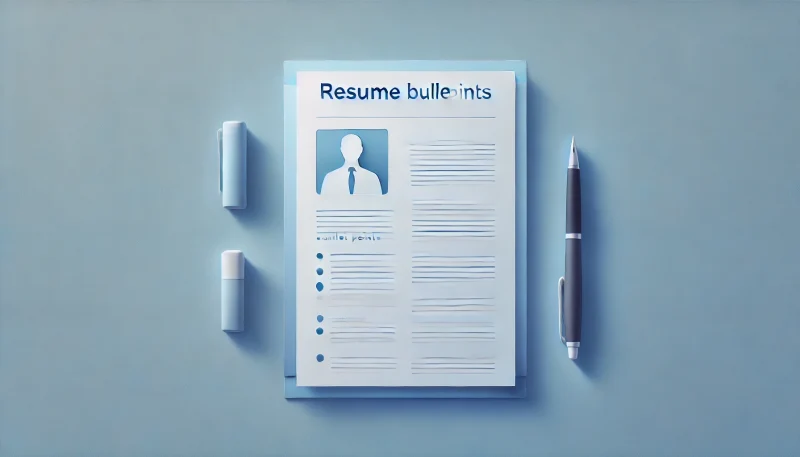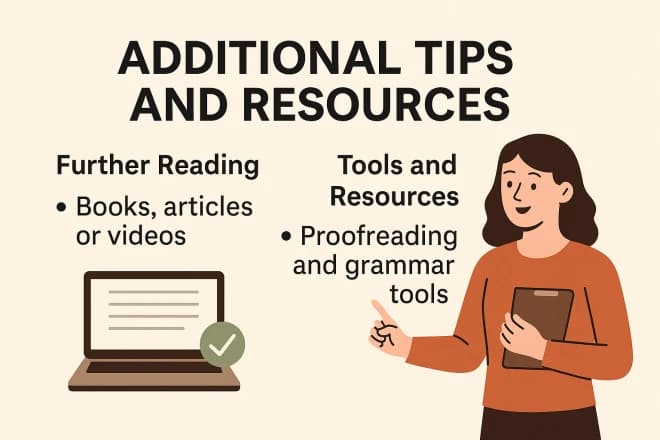Unlock Insights: Find the Answers You Seek on Our Blog
A Complete Guide to Impress Recruiters: How Many Bullet Points Per Job on Your Resume?
By Evelyn Sterling
Welcome to the Ultimate Guide On How Many Bullet Points Per Job on Resume!
This resource is here to help you craft impactful and professional bullet points that will make your resume stand out. Whether you’re a recent graduate building your first resume or a seasoned professional refining your experience, strong bullet points are essential. They showcase your achievements, highlight your skills, and communicate your value to potential employers.
In this blog, we’ll guide you step-by-step on how to optimize your resume bullet points. You’ll learn:
- How many bullet points you should include per job.
- How to craft compelling, action-driven statements.
- Tips to avoid common mistakes that could turn recruiters away.
Let’s get started and make your resume stand out!
Why Bullet Points Matter on a Resume
Bullet points are one of the most powerful tools on your resume. Why? Because they make your experience easy to read and understand. When a recruiter looks at your resume, they want to quickly find the key information—your accomplishments and skills. Resume bullet points organize your details into neat, bite-sized chunks that are simple to scan.
A well-written bullet point does more than list tasks; it highlights your achievements and responsibilities in a clear and focused way. Instead of saying “Handled projects,” a bullet point like “Led a team of 5 to complete a project 2 weeks ahead of schedule” shows what you did and how well you did it.
However, using the right number of bullet points is crucial. Too few, and you might not provide enough information about your experience. Too many, and the important details could get lost in a wall of text. The sweet spot? Around 3-6 bullet points per job, depending on how long you worked there and the role’s importance.
In short, bullet points are your chance to shine. Use them wisely, and they’ll help your resume make a strong impression.
How Many Bullet Points Per Job on Resume?
So, how many bullet points should you include for each job on your resume? The general rule is 3 to 6 bullet points per job. This range gives enough detail to show your skills and achievements without overwhelming the reader.
The exact number depends on a few factors:
- Seniority of the Role: For higher-level jobs, you’ll likely have more responsibilities and achievements to showcase, so 5-6 bullet points make sense. For entry-level roles, 3-4 bullet points are usually enough.
- Length of Time in the Position: If you held the job for many years, include more bullet points to reflect your growth and contributions. Shorter stints might require fewer bullet points.
- Relevance to the Job Applied For: Focus on the most relevant experiences. If a role is directly tied to the job you want, lean toward the higher end of the range.
Examples:
- Entry-level: “Supported marketing campaigns by analyzing data, increasing email open rates by 15%.” (3-4 points)
- Mid-level: “Managed a team of 10, introduced a new process that improved efficiency by 20%.” (4-5 points)
- Senior-level: “Developed and executed a $5M budget strategy, achieving a 25% revenue increase.” (5-6 points)
By following these guidelines, your resume will include just the right amount of detail to catch a recruiter’s attention!

Crafting Effective Bullet Points
Writing great bullet points isn’t hard, but it does take some thought. Here’s how to make them stand out:
1. Start with Action Verbs
Begin each bullet point with strong action words like “Managed,” “Led,” “Developed,” or “Improved.” These verbs show you took initiative and achieved results. For example, instead of saying “Responsible for team projects,” say “Led a team of 5 to complete projects ahead of schedule.”
2. Focus on Achievements, Not Responsibilities
Don’t just list what you were supposed to do—show what you accomplished! Instead of “Handled customer service,” write “Resolved customer issues, achieving a 95% satisfaction rate.”
3. Quantify Your Results
Numbers grab attention and give proof of your success. For instance, “Increased sales by 20% in Q3” is much more impactful than “Improved sales.” Think about how you made a difference and use metrics to back it up.
4. Tailor to the Job Description
Recruiters want to see how your experience fits their needs. Customize each bullet point to highlight the skills and achievements most relevant to the role you’re applying for. This extra step shows you’ve done your homework and are serious about the job.
By following these tips, your bullet points will be clear, impressive, and impossible to ignore!
Common Mistakes to Avoid
When writing bullet points for your resume, it’s easy to make mistakes that could hurt your chances. Here are some common ones to watch out for:
Overloading with Information
Too many bullet points can overwhelm the recruiter. Listing every single task you’ve done makes it hard for them to find the most important details. Stick to 3-6 bullet points per job and focus on your key achievements. Less is more when it comes to keeping their attention.
Using Vague or Generic Language
Phrases like “Worked on projects” or “Helped with tasks” don’t say much about what you actually did. Instead, be specific and impactful. For example, replace “Helped with marketing” with “Designed a marketing campaign that increased engagement by 25%.”
Listing Irrelevant Tasks
Including tasks that don’t relate to the job you’re applying for wastes valuable space on your resume. Focus on accomplishments that demonstrate skills the employer is looking for. For example, if you’re applying for a project manager role, highlight leadership and organizational skills, not unrelated duties.
By avoiding these mistakes, you’ll create bullet points that are clear, relevant, and make a lasting impression.
Customization: Adjusting Bullet Points for Different Jobs
When applying for different jobs, it’s important to customize your bullet points so they align with the role. This shows recruiters that your experience is directly relevant and makes your resume stand out.
1. Prioritize the Most Relevant Points
Start by focusing on the skills and achievements that match the job description. If a job posting emphasizes teamwork and problem-solving, highlight your experience leading a team or resolving challenges. Put these bullet points at the top of each section so they catch the recruiter’s eye first.
2. Remove Older, Less Relevant Experience
If you’ve worked in a variety of roles, some older experiences might not matter for the job you’re applying to. For example, if you’re applying for a marketing position, you don’t need to include bullet points about working as a cashier. Instead, focus on experience that demonstrates your marketing skills.
3. Tailoring Examples for Specific Industries
If you’re applying for a tech job, emphasize technical skills, like “Developed a tool that reduced processing time by 30%.” For a customer service role, focus on communication, like “Resolved 50+ customer complaints per week with a 98% satisfaction rate.” Each industry values different skills, so adapt your bullet points to fit.
Customizing your resume for each job takes extra effort, but it’s worth it. It shows employers that you’re serious about the role and that your experience is exactly what they need!

Frequently Asked Questions
1. What if I don’t have enough achievements to list?
It’s okay if you’re just starting out or feel you don’t have big accomplishments. Focus on any contributions you made, even in small ways. For example, “Assisted in organizing events for 50+ attendees” or “Streamlined filing system to save team 2 hours per week.” Highlight tasks that show initiative or impact, no matter how small.
2. Should I use bullet points for all sections of my resume?
Not necessarily. Bullet points are best for listing your work experience and achievements. For sections like your summary, skills, or education, stick to short sentences or simple lists. This keeps your resume visually balanced and easier to read.
3. Can I exceed six bullet points for senior-level roles?
Yes, but only if the extra points add value. Senior-level roles often involve complex responsibilities and achievements, so it’s okay to include up to 7-8 bullet points if they’re highly relevant. Just avoid listing minor tasks—focus on impactful achievements that demonstrate leadership and results.
4. How do I handle short-term jobs?
For short-term roles, include fewer bullet points—typically 2-3. Highlight what you accomplished during your time there, especially if it’s relevant to the job you’re applying for. If the role isn’t significant, you can leave it out altogether.
5. Should I use the same bullet points for every job application?
No! Tailoring your bullet points to match the job description is crucial. Use keywords from the posting and emphasize relevant achievements. Customizing your resume shows you’ve done your homework and increases your chances of standing out.
Conclusion
Striking the right balance between quality and quantity in your resume bullet points is key to making a great impression. Focus on concise, impactful statements that highlight your achievements and align with the job you’re applying for. Avoid overloading with unnecessary details or generic language.
With these tips, your resume will stand out and leave a lasting impression on recruiters. Ready to make your resume shine? Share your thoughts, or reach out if you need more help crafting the perfect bullet points—we’re here to assist!
AI Tools Categories
Browse all AI tools by category
All AI Tools
229Amazon
5AI Writing Generator
85Article & Content Writing
35Branding & Identity
54Content Generation
170Creative Ideas
32Educational Resources
34E-commerce
14Etsy
6Events & Celebrations
13Facebook
6Gaming & Fun
5Instagram
3Lifestyle & Personal
8LinkedIn
6Marketing & SEO
40Poem & Lyrics Writing
19Professional Documents
31Social Media
44Story & Book Writing
49Text Effects
14TikTok
7Twitter
3Writing Enhancement
36YouTube
11
Highly rated and most popular AI tools curated by our experts
Recently added AI tools that are gaining traction
- AI Post Generator

- AI Bullet Point Generator

- AI Discussion Post Generator

- AI 2 Weeks Notice Letter Generator

- AI Content Creation Ideas Generator

- AI Radio Ad Script Generator

- AI Podcast Script Generator

- AI Resume Objective Generator

- AI Resume Headline Generator

- AI Password Generator

- AI Snapchat Caption Generator

- AI Snapchat Username Generator

- AI Pinterest Board Name Generator

- AI LinkedIn Experience Description Generator

- AI Twitter Hashtag Generator

- AI YouTube Short Idea Generator

we prioritize displaying the latest content closely related to the current blog post.







